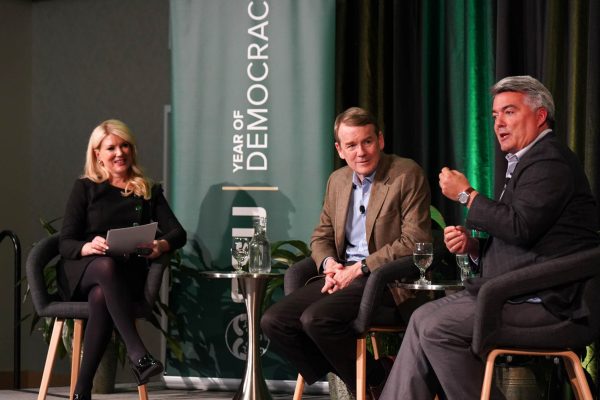
Editor’s Note: All opinion section content reflects the views of the individual author only and does not represent a stance taken by The Collegian or its editorial board.
If 2020 has proven anything, it’s that our economy is incredibly fragile. Through the current economic turmoil, it’s even more alarming when we consider the fiscal challenges that are on the horizon.
Ad
Automation has been a topic of concern and only lends itself to growing worries about the natural progression of advances in technology. A study published by the Brookings Institution predicts that within the coming decades, a quarter of the American workforce is subject to “high” exposure to automation. While this data may not seem alarming to begin with, a quarter of the workforce is an estimated 36 million workers that could be subjected to displacement.
Though these trends suggest a problem happening over the course of many years, it should still be addressed now. Take the trucking industry, for example — should suppliers rapidly employ already existing technology for self-driving trucks, over 3.5 million truck drivers’ jobs would be at risk.
If we wish to avoid economic collapse, the United States needs to enact proactive, preemptive fiscal policy. Unfortunately, it seems the government is electing to place the burden on the workforce itself.
We cannot market ourselves against robots.”
Current workers can only organize, voice their concerns in large numbers and hope their cries won’t fall on deaf ears. Universities are scrambling to prepare students for this shift in workforce structure by teaching skills to differentiate future workers from robots and teaching students how to market themselves as more valuable to a company than a robot. Is this really a sustainable solution?
We cannot market ourselves against robots. Robots do not suffer from human error nor do they have any pesky emotions that generate bias. Ethically, corporations might prefer hiring a robot over a human because it takes identity politics completely out of the equation. Additionally, robots do not need to be paid a wage. Hiring a robot over a human is more efficient both with time, ethics and money.
If profit remains the paramount goal of any corporation, it’s a safe assumption that automation is unavoidable and accelerating. Therefore, we place the burden on the workforce to fight for jobs they will one day lose. We need a progressive and preemptive policy.
I propose three fiscal solutions in an automated society:
- A larger emphasis on jobs that spotlight the “human element.”
- A larger emphasis on jobs that focus on the upkeep of automated technology.
- A policy that gives people an income so they may participate in the economy even if they are displaced workers.
Some jobs will always require a human touch. For example, it’s difficult to see any judge or lawyer being replaced with a robot, as AI cannot easily replicate the innate human nuance required for case evaluation. Nuance exists in many other jobs as well, such as teachers, writers, management positions, politicians, therapists and more.
Furthermore, we will need to account for machines’ larger role in society by having a job market that is more focused on the upkeep of these machines. Such jobs may include computer technicians, software engineers and IT professionals.
Ad
Finally, and most importantly, when people do not have discretionary income, the economy cannot survive, as discretionary spending is the very catalyst of monetary momentum through the cycle of an economy.
Although any fiscal policy requires nuance and sensitive consideration of several issues, one simple solution among many exists. Should corporations no longer have to concern themselves with hourly wages, replacing human workers with machines, money already allocated on the wages can be funneled back into society and keep the economy afloat.
It might be a source of anxiety for many to think of the dramatic changes we will face within the decade. However, these changes do not have to be a bad thing if we restructure our perspective and employ progressive policy.
Approached correctly, automation could generate increased business productivity, more autonomy in personal time for the working class and larger economic freedom for all. No matter the opinion one has on automation, technological advances are inevitable. It’s time we lay the foundation for accommodating these advances in order to avoid economic collapse.
Cat Blouch can be reached at letters@collegian.com or on Twitter @BlouchCat.



















